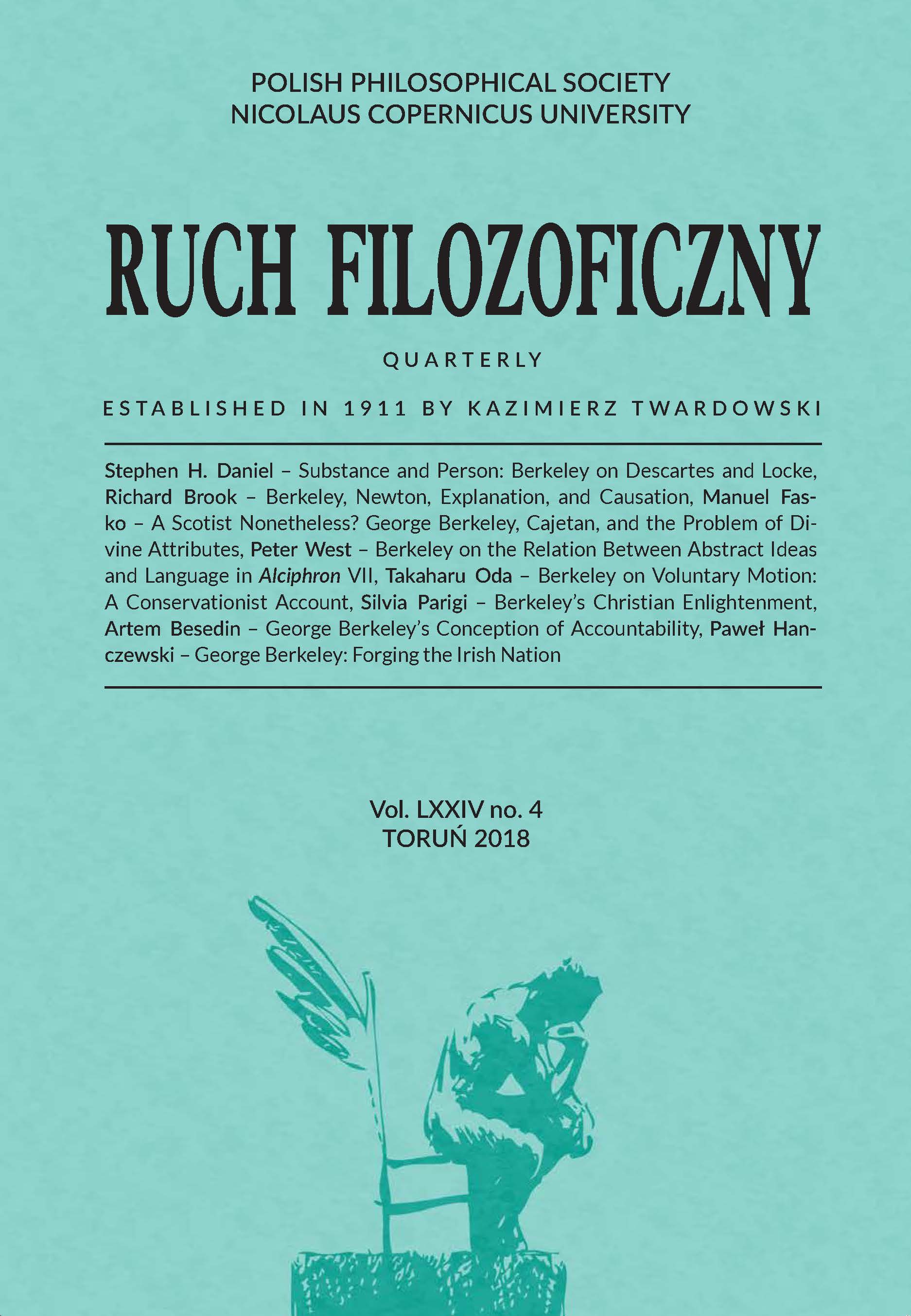George Berkeley: Forging the Irish Nation
DOI:
https://doi.org/10.12775/RF.2018.042Słowa kluczowe
Berkeley, Irlandia, naród, chrześcijaństwoAbstrakt
George Berkeley: wykuwając naród Irlandii
W swoich pracach politycznych i ekonomicznych George Berkeley przedstawił oryginalną koncepcję „prawdziwego patriotyzmu”. Koncepcja nie była powiązana z poglądami politycznymi, kwestiami ekonomicznymi, pozycją społeczną, związkami kulturowymi czy przynależnością do określonego odłamu chrześcijaństwa. Koncepcja nie powstała w opozycji wobec „obcego”. „Prawdziwy patriotyzm” miał uniwersalny charakter i dotyczył każdej osoby, która przyjmowała zasady chrześcijaństwa, nie czyniąc tym samym różnicy między Irlandczykami, Anglikami i Szkotami. Berkeley widział naród jako całość, nie jako grupy bądź klasy rywalizujące o władzę i bogactwo. „Prawdziwy patriotyzm” był darem od Boga i miał bardzo praktyczne cele, dążąc do zapewnienia bezpiecznego i dostatniego życia dla jak największej liczby ludzi. Z szerszej perspektywy, koncepcja Berkeley’a stanowiła część jego debaty z deistami i ateistami, których obdarzał wspólnym mianem „wolnomyślicieli”. Berkeley przedstawił alternatywną i równocześnie utopijną wizję patriotyzmu i narodu irlandzkiego, w stosunku do wizji, która ostatecznie zwyciężyła. Jednak zwycięska wizja bardzo często prowadziła do ksenofobii, będąc jedną z głównych przyczyn krwawych konfliktów toczących Irlandię.
Bibliografia
Bartlett, Thomas. Ireland. A History. Cambridge: Cambridge University Press, 2010.
Berkeley, George. “A Letter to the Roman Catholics of the Diocese of Cloyne.” In The Works of George Berkeley Bishop of Cloyne, edited by Arthur Aston Luce and Thomas Jessop, 229–230. London: Thomas Nelson and Sons, vol. VI, 1953.
Berkeley, George. “A Word to the Wise.” In The Works of George Berkeley, The Works of George Berkeley Bishop of Cloyne, edited by Arthur Aston Luce and Thomas Jessop, 235–249. London: Thomas Nelson and Sons, vol. VI, 1953.
Berkeley, George. “Alciphron; or, the Minute Philosopher.” In The Works of George Berkeley, edited by Alexander Fraser, 26–368. Oxford: Clarendon Press, vol. II, 1901.
Berkeley, George. “An Essays towards preventing the ruin of Great Britain.” In The Works of George Berkeley, The Works of George Berkeley Bishop of Cloyne, edited by Arthur Aston Luce and Thomas Jessop, 69–85. London: Thomas Nelson and Sons, vol. VI, 1953.
Berkeley, George. “Maxims concerning Patriotism.” In The Works of George Berkeley, The Works of George Berkeley Bishop of Cloyne, edited by Arthur Aston Luce and Thomas Jessop, 253–255. London: Thomas Nelson and Sons, vol. VI, 1953.
Berkeley, George. “Philosophical Commentaries.” In The Works of George Berkeley, The Works of George Berkeley Bishop of Cloyne, edited by Arthur Aston Luce and Thomas Jessop, 7–139. London: Thomas Nelson and Sons, vol. I, 1948.
Berman, David. George Berkeley. Idealism and the man. Oxford: Clarendon Press, 1994.
Bourke, Richard. Empire and Revolution: The Political Life of Edmund Burke. Princeton: Princeton University Press, 2015.
Breuninger, Scott. “A Panacea for the Nation: Berkeley’s Tar-water and Irish Domestic Development.” Etudes irlandaises (2009): 29–41.
Breuninger, Scott. Recovering Bishop Berkeley: Virtue and Society in the Anglo-Irish Context. New York: Palgrave Macmillan, 2010.
Brewer, John. The Sinews of Power: War, Money and the English state, 1688-1783. London: Unwin, 1989.
Colley, Linda. Britons: Forging the Nation 1707-1837. New Haven and London: Yale University Press, 1992.
Conroy, Graham. “George Berkeley and the Jacobite Heresy: Some Comments on Irish Augustan Politics.” Albion: A Quarterly Journal Concerned with British Studies vol. 3 no. 2 (Summer, 1971): 82–91.
Dickinson, Harry. Bolingbroke. London: Constable, 1970.
Fabricant, Carole. “Swift the Irishman.” In The Cambridge Companion to Jonathan Swift, edited by Christopher Fox, 48–72. Cambridge: University Press, 2003.
Fletcher, Andrew. “Speeches by a member of the Parliament which began at Edinburgh the 6th of May, 1703.” In Andrew Fletcher Political Works, edited by John Robertson, 129–173. Cambridge: Cambridge University Press, 1997.
Kelly, Patrick. “Berkeley’s Querist: ‘Hints… What Is to Be Done in this Critical State of our Affairs’ or Proposals for a Hyperborean Eutopia?.” In The Bloomsbury Companion to Berkeley, edited by Bertil Belfrage and Richard Brook, 196–215. London: Bloomsbury, 2017.
Kidd, Colin. “Integration: Patriotism and Nationalism.” In A Companion to Eighteenth-Century Britain, edited by Harry Dickinson, 369-380. Oxford: Blackwell, 2002.
Koenigsberger, Helmut. “Dominium Regale or Dominium Politicum et Regale. Monarchies and Parliaments in Early Modern Europe.” In Politicians and virtuosi. Essays in early modern history, edited by Helmut Koenigsberger, 1–25. London: Hambledon Press, 1986.
Leerssen, Joep. “Anglo-Irish Patriotism and Its European Context: Notes towards a Reassessment.” Eighteenth-Century Ireland 3 (1988): 7–24.
Pocock, John. “Civic Humanism and its Role in Anglo-American Thought.” In Politics, Language and Time. Essays on political thought and history, edited by John Pocock, 80-103. London: Methuen, 1972.
Pocock, John. The Machiavellian Moment. Florentine Political Thought and the Atlantic Republican Tradition. Princeton: Princeton University Press, 1975.
Robertson, John. “Introduction.” In Andrew Fletcher Political Works, edited by John Robertson, ix-xxx. Cambridge: Cambridge University Press, 1997.
Scott, Paul. “Andrew Fletcher, a Pioneer of the European Idea.” In The Saltoun Papers: Reflections on Andrew Fletcher, edited by Paul Scott, 13–19. Edinburgh: Saltire Society, 2003.
Pobrania
Opublikowane
Jak cytować
Numer
Dział
Statystyki
Liczba wyświetleń i pobrań: 298
Liczba cytowań: 0



